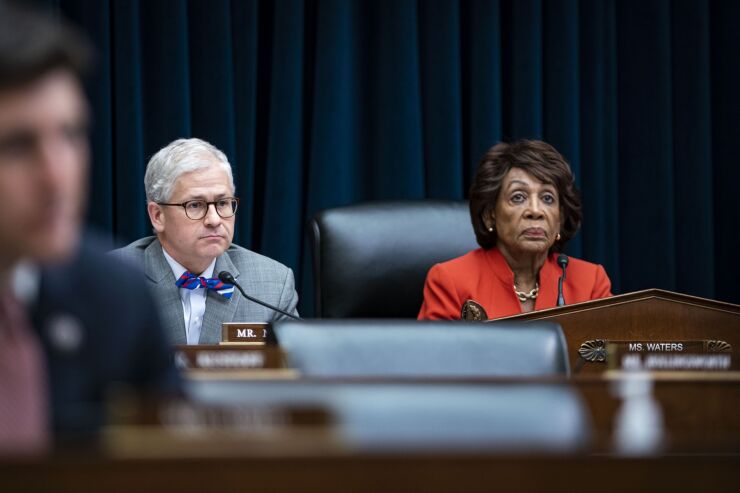
WASHINGTON — A bill that
The bill mostly lays out the criteria by which to determine whether the Securities and Exchange Commission or the Commodity Futures Trading Commission should oversee particular crypto assets.
"Unfortunately, our current regulatory framework is preventing digital asset innovation from reaching its full potential," said Rep. Patrick McHenry, R-N.C., chairman of the House Financial Services Committee and one of the sponsors of the bill. "The SEC and the CFTC are currently in a food fight for control over this asset class. They have created an impossible situation where the same firms are subject to competing and contradictory enforcement actions by the two different agencies."
Critically for banks, the bill prohibits the SEC from creating rules that would prevent banks from custodying cryptocurrency assets. The industry argues that the SEC did so when it published staff accounting bulletin 121, which required that companies that hold crypto assets in custody record those as liabilities on their balance sheets.
The bill passed in the House 279-136, with 71 Democratic lawmakers voting in favor of the legislation. Those lawmakers included Rep. Nancy Pelosi, D-Calif., the former House speaker.
The vote represents a shift in the way that Capitol Hill considers cryptocurrency legislation. More Democratic lawmakers are considering the idea of setting up a crypto regulatory regime favorably, particularly those in New York, the Northeast and California.
Earlier in the day, the White House said in a statement of policy that it's opposed to the bill. Still, advocates for cryptocurrency took that as a victory, as the Administration's language was considerably softer than
Still, the bill has to pass through the Democratically-controlled Senate before it could potentially head to President Joe Biden's desk. And most Democrats, including Rep. Maxine Waters, D-Calif., the House finance panel's ranking member, still oppose it.
Many Democratic representatives argued on the House floor that the bill contains a section added earlier this month — without committee debate — that would give not just crypto firms, but other more traditional financial instruments a regulatory arbitrage loophole.
"Language was added to the bill after it was marked up by the committees of jurisdiction that would allow even some traditional securities to also exist in this regulatory no-man's-land," Waters said. "
Waters referred to Title Two of the bill, which defines the term "investment contract asset."
"Assets that fall under this definition are explicitly deemed not to be securities, and therefore not under the SEC's purview, but the bill doesn't provide an alternative legal framework for these assets," she said.
The Republican sponsors of the bill said on the floor that this interpretation is misleading.
"The minority has also charged time and time again that somehow a great securities loophole was offered and opened in this bill," said Rep. French Hill, R-Ark. "That's just not true; that's not a factual statement."
He said that the bill specifically says that the term "digital assets" doesn't include assets like notes, stocks and Treasuries.
"So it does not open the loophole that the ranking member of the Financial Services Committee charges," he said.





